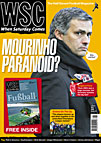 As we reach the end of the season is the Premier League the most unpredictable league?
As we reach the end of the season is the Premier League the most unpredictable league?
Looking at the tables as the end of the season approaches, it might occur to you that, with very few exceptions, no one really knows anything. Passages of play in matches have been described as little more than a series of random events, their final outcome decided by whoever is able to impose a distinct pattern, which more often than not neither side manages to do. This season, the same sense of galumphing randomness has applied to the football predictions business. Never before have the forecasts for how the season will pan out come so badly unstuck – the confident assertions made in tabloid and broadsheet columns and TV discussions may as well be seen in same light as contributions to the astrology page.
Of course some forecasts can, without risk, be made at the start of a season. You wouldn’t expect to be hailed as one of the game’s great thinkers if you picked Chelsea, Man Utd, Liverpool and Arsenal to take four of the seven European places available to English clubs, nor if you suggested that at some point both José Mourinho and Sir Alex Ferguson would mutter darkly about conspiracies against their teams from cabals within the English football establishment.
For the rest – and no one saw Arsenal struggling at home rather than abroad – it’s as random as the balls called out at bingo. Most predictions for the start of this season confidently placed both Wigan and West Ham in the bottom three. Alan Pardew had been almost run out of Upton Park during the final few month of last season, before being saved by the late burst of form that took the team through the play-offs; the Hammers, none the less, were widely tipped to be heading for one of their worst ever seasons as they endured the inevitable relegation suffered by play-off winners.
Wigan, despite Dave Whelan’s millions, were expected to do little better, with significance being attached to the fact that Paul Jewell had flopped in his last Premiership job, with Sheffield Wednesday. Sunderland, by contrast, were in the safe hands of Mick McCarthy, who cannily assembled the Championship’s best team last year. Now, statistics say that McCarthy’s torrid six months make him the worst ever top-level manager, certainly the only one to have presided over 19 home games without a win.
In the Championship, all three relegated sides were among the favourites to go up; only one is a contender and it is possible that Sheffield United, relegated in 1994, will be the only promoted side to have played in the top flight in recent memory. In Scotland, Gordon Strachan is about to celebrate a comfortable title success having started his reign so catastrophically as to suggest he wouldn’t last till Christmas. Villarreal are in the Champions League semi-finals and there’s an excellent chance a new and unexpected name will be on the UEFA Cup.
Steve Bruce began the season seen as one of the most astute Premiership managers, roughly on a par with Alan Curbishley and Sam Allardyce, and a Newcastle manager in waiting, while Birmingham were widely praised for the way in which they wrapped up signings early last summer, rather than joining in the scramble for deals in the last few days. Now the talk is of how Bruce looks like a broken figure, having seemingly lost the ability to organise a defence.
It’s not just pre-season assessments that have been found wanting. Steve McClaren went from being a plausible candidate for the England job to someone who was supposedly on the verge of losing his current post as a Boro team apparently packed with demotivated players plummeted down the table. Now, however, with his club (as we write) in the last eight of the UEFA Cup and one game away from the FA Cup semis, there are no declarations of surprise that he is on a shortlist of four to replace Sven-Göran Eriksson.
At the midway point in the season in late December, when they had 17 points and had suffered three 4-0 defeats in the space of seven matches, Everton were said to be stuck fast in the relegation mire, after which the team promptly embarked on their longest sequence of successive home wins in 16 years. Last month, our cover suggested that Portsmouth, with no sign of a revival since Harry Redknapp’s return, might be in a state of some confusion. Publication was followed by three successive wins and as we go to press once more Milan Mandaric is discussing extending Harry’s contract.
Still, at least we approached the predictions business as a joke. On the back pages, too many easy conclusions are jumped to and stuck fast. These opinions are expressed with a certainty that is often unjustified and a hysteria that is completely misplaced. When that proves to be so the conventional wisdom suddenly changes as if a ripple has passed across Fleet Street – and, strangely, no mention is ever made again of how wrong those headlines were.
From WSC 231 May 2006. What was happening this month